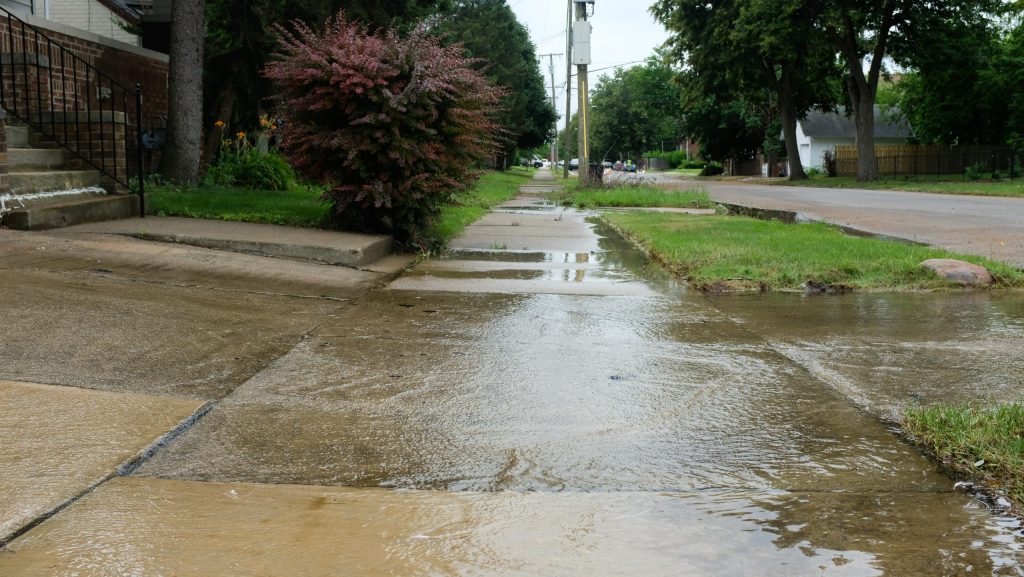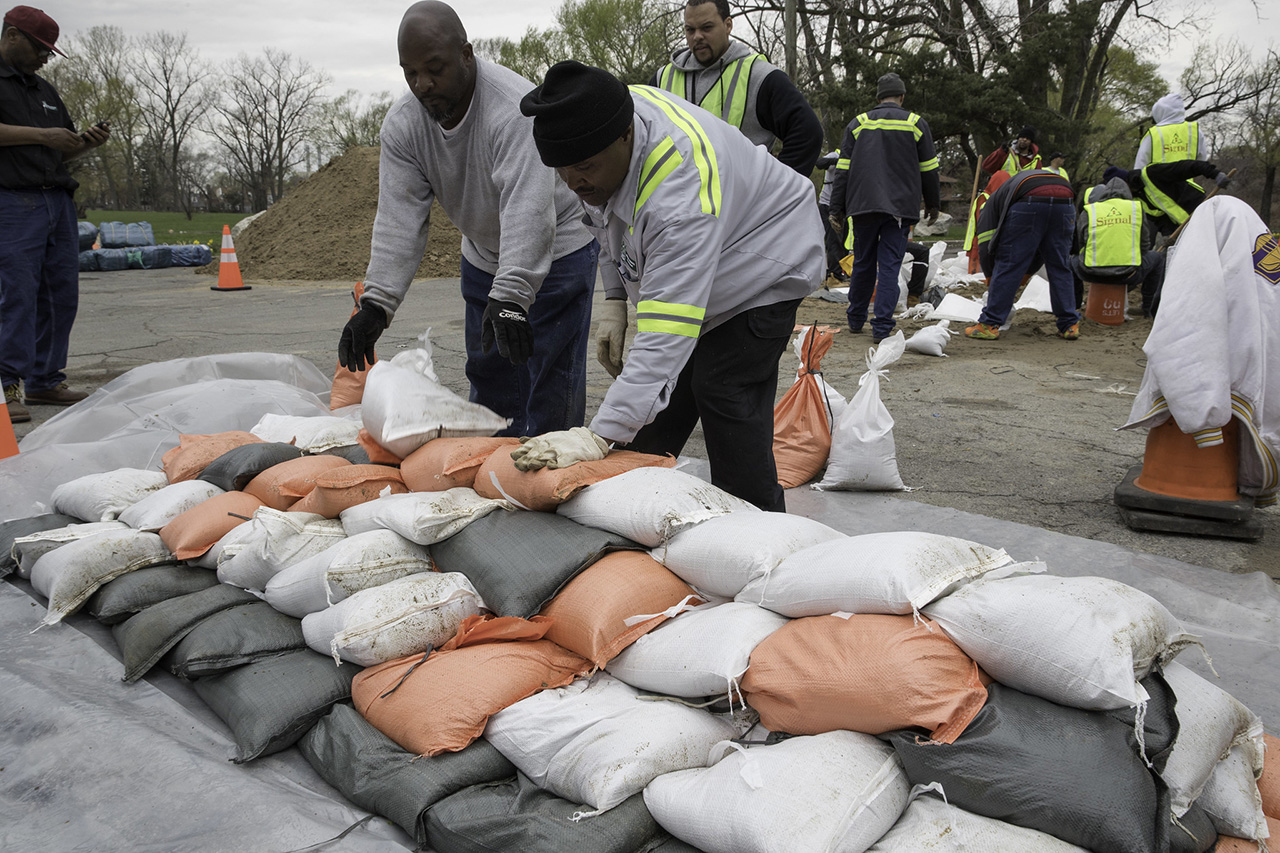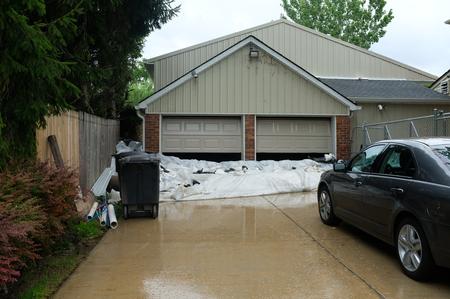How to File a Claim, Clean Up Your Home and Get Help After Metro Detroit Flood
Prepare your family and home, clean up safely, seek financial relief and more.

Flooding in Detroit's Jefferson Chalmers neighborhood, July 2019.
Have you been affected by flooding or want to help? Check out these resources. Have a question? Get in touch by emailing us.
Jump to a section:
Cleanup
Prepare
Hotline Support
File a Claim
Apply for Relief
How You Can Help Others
Cleanup
The EPA has several guides for homeowners and safe cleanup protocols, including:
Flood Cleanup and the Air in Your Home Booklet: This 28-page booklet tells you how to clean up after a flood and how to prevent indoor air problems. When cleaning, make sure to wear an N-95 respirator, goggles, gloves and long pants, a long-sleeved shirt and boots.
The Homeowner’s and Renter’s Guide to Mold Cleanup After Disasters: Cleaning up after a flood can pose health risks. You and your family should wait to re-enter your home until professionals tell you it is safe, with no structural, electrical or other hazards. If your home was flooded and you were not able to dry your home (including furniture and other items) within 24-48 hours, you should assume you have mold growth. You need to completely dry everything, clean up the mold, and make sure you don’t still have a moisture problem.
Fact Sheet: Flood Cleanup – Protecting Indoor Air Quality: This fact sheet discusses problems caused by microbial growth, as well as other potential effects of flooding, on long-term indoor air quality and the steps you can take to lessen these effects. It covers how to get ready for cleanup, remove standing water and more.
The American Red Cross also has a comprehensive guide Disaster Cleanup & Repair For Your Home and offers the following tips:
- Be careful when moving furnishings or debris, because they may be waterlogged and heavier.
- Throw out items that absorb water and cannot be cleaned or disinfected. This includes mattresses, carpeting, cosmetics, stuffed animals and baby toys.
- Throw out all food, beverages and medicine exposed to flood waters and mud. When in doubt, throw it out. This includes canned goods, plastic utensils, baby bottle nipples and containers with food or liquid that has been sealed shut.
- Pump out flooded basements gradually (about one-third of the water per day) to avoid structural damage. If the water is pumped out completely in a short period of time, pressure from water-saturated soil on the outside could cause basement walls to collapse.
- Service damaged septic tanks, cesspools, pits and leaching systems as soon as possible. Damaged sewage systems are health hazards.

The City of Detroit is encouraging residents to clean and sanitize basements immediately unless there is an immediate health hazard. In those cases, the Detroit Water & Sewerage Department (DWSD) will send city or contractor crews to those homes. Residents should indicate the hazard when completing the online form at detroitmi.gov/waterdamageclaims or calling 313-267-8000.
Residents should place debris at the curb. The Department of Public Works (DPW) crews will provide continuous bulk pickup service in flood-affected neighborhoods. Ticketing is suspended in those neighborhoods until the removal is complete.
Volunteers and City of Detroit employees will help senior or disabled residents who need assistance clearing flood-damaged materials from their home. Residents should indicate if they are seniors or persons with a disability at detroitmi.gov/waterdamageclaims or when calling DWSD at 313-267-8000.
The City of Detroit is offering residents flood cleaning supplies such as brooms, buckets, mops, sponges, gloves, KN95 masks and liquid cleaners. Supplies will be distributed as a drive-through. Residents may pick up cleaning supplies on July 1 and July 2 from 10 a.m. to 2 p.m. at two locations: Patton Recreation Center, 2301 Woodmere, and Samaritan Center, 5555 Conner.
Prepare
There’s more rain in the forecast this week. Here are some tips from the American Red Cross to prepare your home and family for potential flooding.
- Assemble an emergency preparedness kit.
- Create a household evacuation plan that includes your pets.
- Stay informed about your community’s risk and response plans.
- Ensure each family member knows how to get back in touch if you are separated during an emergency.
Call
Metro Detroiters who need assistance after this weekend’s floods can call the United Way for Southeastern Michigan’s 2-1-1 hotline for food, shelter and help cleaning up.
Senior Director Tamara Bolden says many callers seeking help have experienced property damage.
“They’ve lost items like washers, dryers, furnaces, hot water tanks. Some people store food … in the basement. They’ve lost food. They’ve lost clothing. And what’s happening externally within the community is people have abandoned their cars or cars are impounded,” Bolden says.
File a Claim

Property owners can file claims for health and property damage from flooding. Under state law, residents have 45 days to file a claim. To get started, property owners should contact the city where they live so officials can help guide them through the process and provide the appropriate paperwork.
To file a claim for damages, you must file a written notice of claim within 45 days of the date that the damages occurred (in this case, by Aug. 9). Under Michigan Public Act 222 of 2001, a property owner may seek compensation for property damage or physical injury from a governmental agency if the claimant meets certain requirements under the law.
Filing a claim within the 45-day time period does not automatically mean you will be entitled to reimbursement or compensation for your damages. It means your claim will be reviewed to determine if there is any governmental liability. But any claims not filed within that period will not be eligible for reimbursement.
The written notice must include your name, address and phone number and the address of the affected property. You also must provide the date of discovery of the damage along with a brief description of the incident. Download an example of the form here.
Losses should be documented with photos and videos of the flood damage and receipts related to cleaning and repairs. Homeowners should make note of all of the damage and losses from the flooding over the weekend and file a claim with their insurance company immediately.
Detroit residents may be able to get reimbursement by filing a claim with the Detroit Water & Sewerage Department (DWSD). Those claims also may be filed with FEMA if a presidential declaration of disaster is issued.
For most people during this historic flood event, a DWSD sewer defect is not likely the cause of the damage. But filling out the form will get residents a head start on federal assistance, the city says.
For more information, go to detroitmi.gov/waterdamageclaims or call 313-267-8000 for assistance.
The Eastside Community Network is also helping residents apply for flood recovery assistance. Starting Thursday at the Stoudamire Wellness Hub at 4401 Conner St., the network will provide assistance in submitting requests for state emergency relief and damage claims and sewage backup applications. Volunteers and donations are also needed. For more information, email help@ecn-detroit.org or call 313-364-9423.
Residents in Dearborn can notify the city of a flooding/backup issue at their location by filling out this form. Public Works is inspecting and monitoring all sewers where flood damage is reported.
Residents in Dearborn Heights can fill out a flood survey here as well as find local resources on the city’s website.
State Rep. Helena Scott, who represents Highland Park and a portion of Detroit, is seeking flood feedback. The information collected on this form will be relayed to each respective city and township to help with data collection for potential relief. It does not replace any official claims form that need to be filed for reimbursements with any government agency or insurance provider. Fill it out here.
Apply for Relief
Low-income residents affected by recent flooding in Michigan may be eligible for emergency relief assistance through the Michigan Department of Health and Human Services (MDHHS) through the State Emergency Relief program.
The program provides immediate help to families and individuals facing conditions of extreme hardship or for emergencies that threaten health and safety. It is available to eligible residents that need help with home repairs necessary to correct unsafe conditions and restore essential services.
The lifetime maximum amount of funds available for non-energy related home repairs is $1,500 per household. State Emergency Relief Program assistance is available for repairs not covered by homeowner’s insurance for the basic house structure, hot water heater, septic/waste disposal system, doors/windows, extermination services, electrical, plumbing, roofs and wells.
Applicants must be the owner or purchaser of the home and meet other eligibility requirements — including income limits — to qualify.
To apply for State Emergency Relief, visit michigan.gov/MIBridges. Anyone who does not have internet access or needs assistance applying can contact their local MDHHS office. Or call 2-1-1 to be referred to other community resources.
How You Can Help Others
Detroit is looking for volunteers to work four-hour shifts to help neighbors clean up their homes and move debris from the basements of elderly or disabled residents. The city will provide protective gear.
The schedule of volunteer gathering centers will be set later this week for different neighborhoods. To sign up as a volunteer, go to detroitmi.gov.
The United Way for Southeastern Michigan is also in need of volunteers as well as monetary donations. The 211 hotline is open 24 hours per day. People can get trained to help take calls in crisis or help property owners clean up their homes.
Have extra equipment and supplies like a dehumidifier, protective gear and other essential items? Check out your Nextdoor group and mutual aid networks and nonprofits looking for donations.
WDET news intern Allison Pirog contributed to this report.
Related Coverage
Detroit Seeking Help From FEMA After Historic Rain Event, Investing Millions in Infrastructure
Metro Detroit Flooding Result of Climate Change, Underinvestment in Infrastructure, Whitmer Says
Governor Whitmer Declares State of Emergency in Wayne County to Deal with Flooding
Trusted, accurate, up-to-date
WDET is here to keep you informed on essential information, news and resources related to COVID-19.
This is a stressful, insecure time for many. So it’s more important than ever for you, our listeners and readers, who are able to donate to keep supporting WDET’s mission. Please make a gift today.
